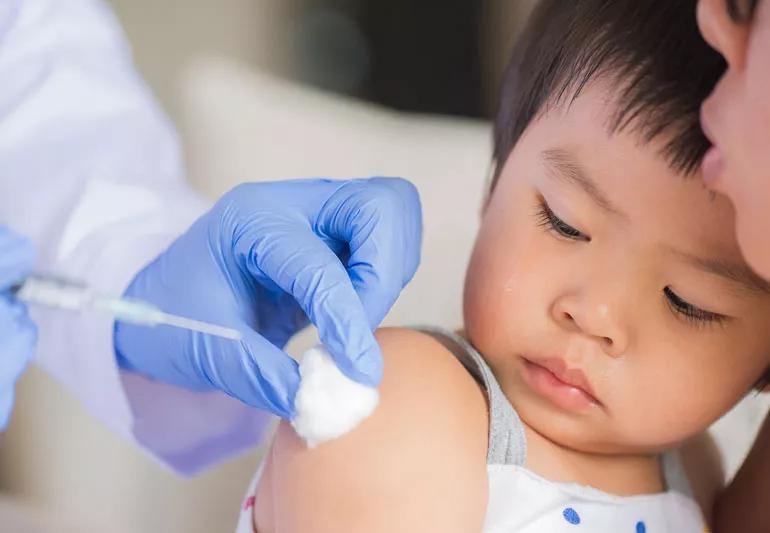These visits include getting important vaccines and checking on developmental milestones

Image content: This image is available to view online.
View image online (https://assets.clevelandclinic.org/transform/48dcacfc-c22d-4fbc-81ad-7f7c95f99761/childWellVisitVaccine-1025414242-770x553_jpg)
Small child receiving vaccine at doctor's office
Do you really need to vaccinate your kids and get regular well-checks?
Advertisement
Cleveland Clinic is a non-profit academic medical center. Advertising on our site helps support our mission. We do not endorse non-Cleveland Clinic products or services. Policy
The answer, says pediatrician Wadie Shabab, MD, is a resounding, “Yes!”
Vaccines are very safe and have saved children from getting many diseases, from polio to chickenpox. And being on a well-child visit schedule helps make sure your child is meeting important developmental milestones.
Dr. Shabab explains when your child needs which shot and a trip to the doctor’s office.
Childhood immunizations help protect your child from getting a number of illnesses. These vaccines, mostly given as shots at a well-child visit, are very safe and can help prevent easily spread diseases that can cause serious health problems.
The American Academy of Pediatrics recommends the following:
Advertisement
Key:
DTaP: Diphtheria, tetanus, acellular pertussis vaccine.
HAV: Hepatitis A vaccine.
HBV: Hepatitis B vaccine.
Hib: Haemophilus influenzae type B, or flu.
HPV: Human papillomavirus vaccine.
IPV: Inactivated polio vaccine.
MCV4: Meningococcal conjugate serotype A, C, W and Y vaccine for meningitis.
Men B: Meningococcal Serotype B vaccine for meningitis.
MMR: Measles/mumps/rubella vaccine.
PCV: Pneumococcal conjugate vaccine for meningitis.
Rotavirus: Vaccine against potentially life-threatening diarrhea.
TB: Tuberculosis screening.
Varicella: Chickenpox vaccine.
It’s essential that you stick to a well-child check schedule. Making sure your child is up to date on recommended vaccines is vital for your child’s health.
Children who aren’t vaccinated are more likely to contract diseases like whooping cough and measles. These diseases are highly contagious and can become serious health issues.
Additionally, well-checks are necessary to track and document your child’s growth and developmental and behavioral milestones. During a well-check visit, parents and caregivers can discuss any concerns they have when it comes to vaccinations and their child’s overall health.
“Children grow and develop fast — and the rate of this growth is the fastest in the first three years of life,” notes Dr. Shabab. “Your healthcare provider will monitor your child’s weight, height, BMI, vital signs, hearing, vision, developmental/behavioral milestones, lead, TB and other screening tests at the appropriate age and interval during their well-child visits.
“This information, along with discussing your child’s diet, sleeping, academic achievement, screen time and safety, will help your provider in partnering with you in maintaining and helping your child reach their health and developmental goals.”
Advertisement

Delivered every Tuesday!
Sign up for our Health Essentials emails for expert guidance on nutrition, fitness, sleep, skin care and more
Learn more about our editorial process.
Advertisement
Hydration and sleep are as important as avoiding dirty surfaces
Maturity and safety matter more than age
Listen to your child to help them identify their fear and name it, but don’t reinforce it
Have a consistent routine and heap on the positive reinforcement
This parenting style relies on empathy, understanding and respect
Expert advice on helping your child to get better, faster
Get expert tips on prevention and treatment
Know when your child needs medical attention
Type 2 diabetes isn’t inevitable with these dietary changes
Applying a hot or cold compress can help with pain
Pump up your iron intake with foods like tuna, tofu and turkey